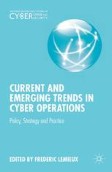Search
Search Results
-
Social Network Analysis in the Field of Crime Intelligence: Historical Development, Application and Limitations
This chapter examines the existing literature on social network analysis (SNA). It begins by outlining the underlying theories that inform SNA....
-
Terrorism Risk Forecasting by Ideology
The purpose of the present study is to produce foresights on terrorism. For the first time in the literature, we test the predictive validity of risk...

-
Hacktivism: Conceptualization, Techniques, and Historical View
Hacktivism is a relatively new phenomenon which originated in the 1980s from the meeting of hackers’ communities and technological-enthusiast...
-
Integrated Cyber Crime and Cyber Security Model
This chapter illustrates the suggestions about specialised legal, institutional and awareness efforts by the criminal justice system (CJS)Criminal...
-

-
Cybercrime in India: Laws, Regulations, and Enforcement Mechanisms
Cybercrime involves the use of computers or computer network to commit criminal activity. Cybercrime is not unique to India. As the country has...
-
Evaluating the Control of Money Laundering and Its Underlying Offences: the Search for Meaningful Data
This article examines the political and criminological history of anti-money controls, including the involvement of Asian countries and the varied...

-
The Impact of Psychosocial Factors in the Preparation for Islamic Radicalism in Kosovo
The deep economic crisis and political tensions over the last two decades of the twentieth century and especially the developments of the war of...
-
Legal Framework for Cyber Economic Crimes: A Review
This chapter gives an overall view of the existing legal frameworkLegal framework available for dealing with Cyber Economic CrimeCyber economic...
-
Hacktivism: Conceptualization, Techniques, and Historical View
Hacktivism is a relatively new phenomenon which originated in the 1980s from the meeting of hackers’ communities and technological-enthusiast...
-
Cybercrime in India: Laws, Regulations, and Enforcement Mechanisms
Cybercrime involves the use of computers or computer network to commit criminal activity. Cybercrime is not unique to India. As the country has...
-
The Radicalization of Democracy: Conflict, Social Movements and Terrorism
The idea of democracy is being championed across the world, with some fifty new countries embracing this type of political system between 1974 and...
-
Chapter 4 Mocking the State: Heroism, Humanity and Humiliation in the Context of Naxal Jailbreaks in India
This chapter will analyse the position, potentialities and politics of mass prison escapes in the context of violent, anti-state political movements...
-
Organised Crime, Wild Cards and Dystopias
This chapter defends the use of imagination and creativity as a tool to understand and tackle the futureFuture of organised crimeOrganised...
-
Terrorism in the UK Within a Global Context
It has been argued that ‘terrorism and protest are the antithesis of each other…Terrorism is about intimidating people and undermining the democratic...
-
The Police Function: What Do the Police Do?
The policing function in the UK is determined by both history and the lack of legal definitions of the police’s statutory functions. Millie (2014, p....
-
Terrorism Financing
In February 2013, three men were convicted at Woolwich Crown Court in London of preparing an act of terrorism. The trio, Islamic extremists from...
-
Cyber Conflict: Disruption and Exploitation in the Digital Age
In August of 1986, a former astronomer-turned-systems-administrator, on his second day on the job, attempted to determine what was causing a 75-cent...
-
The Pro-Social Political Vandal
In his original typology of vandalism, Cohen (1973: 35) referred to ‘ideological vandalism’ as that which is perpetrated with the intention of...
-
Towards a Transnational and Comparative Approach
The power to stop people in public places, to question them and to search their person and belongings is common to policing worldwide. Drawing on the...
